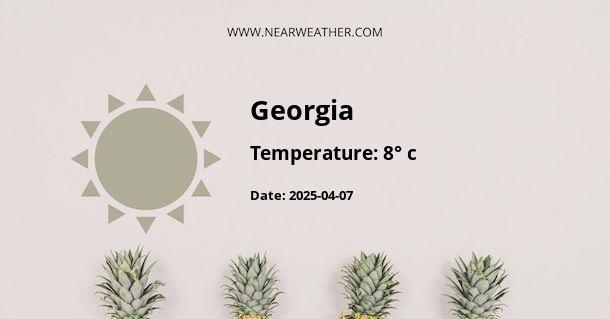Georgia Weather Today
Daily Weather Forecast & Temperature in Georgia
Sun & Moon
Location Info
Embed This Weather
Climate and Weather in Georgia, GE
Georgia, located in the Caucasus region of Eurasia, experiences a diverse climate due to its geographical features and proximity to both the Black Sea and the Greater Caucasus Mountains. The country's climate is influenced by its latitude, elevation, and oceanic and continental air masses, resulting in a wide range of weather conditions throughout the year.
Seasonal Overview
Georgia has four distinct seasons: spring, summer, autumn, and winter. Each season brings its own unique weather patterns and temperatures.
| Season | Temperature Range | Weather Conditions |
|---|---|---|
| Spring (March to May) | 10°C to 20°C | Mild and often rainy, with occasional thunderstorms. Temperatures gradually rise throughout the season. |
| Summer (June to August) | 20°C to 30°C | Warm to hot with high humidity. Most of the country experiences dry and sunny weather, although occasional thunderstorms can occur. |
| Autumn (September to November) | 10°C to 20°C | Cool and often rainy, with occasional fog. The foliage displays vibrant colors, making it a popular time for outdoor activities. |
| Winter (December to February) | 0°C to 10°C | Cold and often snowy, especially in higher elevations. Coastal areas experience milder temperatures, but strong winds can make it feel colder. |
Regional Variations
Due to its varied topography, Georgia exhibits regional variations in climate and weather conditions.
Western Georgia
Western Georgia, including the coastal areas along the Black Sea, has a humid subtropical climate. This region experiences relatively mild winters and hot, humid summers. The average annual rainfall is higher compared to other parts of the country, contributing to lush vegetation and rich agricultural productivity.
Eastern Georgia
Eastern Georgia, on the other hand, has a more continental climate with greater temperature variations throughout the year. Summers are generally hot and dry, while winters can be cold and snowy, especially in higher elevations. The Greater Caucasus Mountains act as a barrier, blocking the influence of the Black Sea and causing a rain shadow effect in certain areas, resulting in drier conditions.
Extreme Weather Events
Georgia is susceptible to various extreme weather events, including heavy rainfall, thunderstorms, and occasional snowstorms in winter. These events can sometimes lead to flooding, landslides, and disruption of transportation systems.
In recent years, the country has also experienced heatwaves and periods of drought, which can negatively impact agriculture and water resources. The government has implemented measures to mitigate the effects of extreme weather events and adapt to climate change.
Tourism and Travel
Georgia's diverse climate makes it an attractive destination for tourists throughout the year. The country offers a wide range of outdoor activities and cultural experiences, catering to different preferences and interests.
During the spring and autumn months, when temperatures are mild and pleasant, visitors can explore Georgia's picturesque landscapes, go hiking in the mountains, or enjoy wine tastings in the vineyards. Summer is ideal for beachgoers and those seeking a sunny holiday along the Black Sea coast. Winter attracts winter sports enthusiasts to the ski resorts in the Greater Caucasus Mountains.
Recommended Clothing
Considering the varying weather conditions, it is advisable to pack accordingly when traveling to Georgia. Lightweight and breathable clothing is recommended for summers, along with sunscreen and a hat to protect against the sun. In spring and autumn, it is advisable to carry a mix of light and warm clothing, as temperatures can fluctuate. Winter travelers should pack warm clothing, including thermal layers, hats, gloves, and waterproof boots.
Best Time to Visit
The best time to visit Georgia depends on personal preferences and planned activities. Spring and autumn are generally considered the most pleasant seasons, with mild temperatures and colorful landscapes. However, each season has its own charm and offers unique experiences.
It is advisable to check the weather forecast before visiting and to plan activities accordingly, especially if engaging in outdoor pursuits or visiting higher elevations.
Conclusion
Georgia's climate and weather conditions vary significantly throughout the year, offering a diverse range of experiences for both locals and tourists. From the humid subtropical climate of the coastal areas to the continental climate of the mountains, each region has its own distinct characteristics. Visitors to Georgia should consider the seasonal variations and pack accordingly to make the most of their trip.
What is the Latitude and Longitude of Georgia?
Georgia's Latitude is 42.000000 & Longitude is 43.500000.
What is the weather in Georgia today?
Weather in Georgia is 10° today.
What is the climatic condition of Georgia today?
Climate Conditions in Georgia shows clear sky today.
What is the humidity in Georgia today?
Humidity in Georgia is 52% today.
What is the wind speed in Georgia today?
Wind speed in Georgia is 8.93 km/h, flowing at 86° E wind direction.
What does it feel like in Georgia today?
It feels like 8° in Georgia today, with 7% cloud cover and 10 km visibility.
